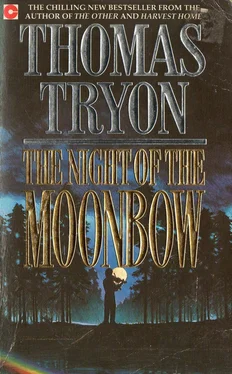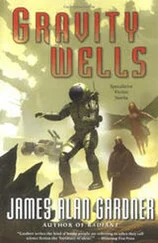Thomas Tryon - The Night of the Moonbow
Здесь есть возможность читать онлайн «Thomas Tryon - The Night of the Moonbow» весь текст электронной книги совершенно бесплатно (целиком полную версию без сокращений). В некоторых случаях можно слушать аудио, скачать через торрент в формате fb2 и присутствует краткое содержание. Жанр: Триллер, на английском языке. Описание произведения, (предисловие) а так же отзывы посетителей доступны на портале библиотеки ЛибКат.
- Название:The Night of the Moonbow
- Автор:
- Жанр:
- Год:неизвестен
- ISBN:нет данных
- Рейтинг книги:3 / 5. Голосов: 1
-
Избранное:Добавить в избранное
- Отзывы:
-
Ваша оценка:
- 60
- 1
- 2
- 3
- 4
- 5
The Night of the Moonbow: краткое содержание, описание и аннотация
Предлагаем к чтению аннотацию, описание, краткое содержание или предисловие (зависит от того, что написал сам автор книги «The Night of the Moonbow»). Если вы не нашли необходимую информацию о книге — напишите в комментариях, мы постараемся отыскать её.
The Night of the Moonbow — читать онлайн бесплатно полную книгу (весь текст) целиком
Ниже представлен текст книги, разбитый по страницам. Система сохранения места последней прочитанной страницы, позволяет с удобством читать онлайн бесплатно книгу «The Night of the Moonbow», без необходимости каждый раз заново искать на чём Вы остановились. Поставьте закладку, и сможете в любой момент перейти на страницу, на которой закончили чтение.
Интервал:
Закладка:
When he had covered up his work with a sheet and put his tools away, Leo would leave the lodge for Fritz’s cottage, which, while the bad weather continued, unabated, had become among a certain group of campers a refuge from the stultifying atmosphere of their cabins, a place where boys unused to being kept indoors, unused even to one another’s company, older boys as well as Virtue small fry, found themselves mingling together, the members of an unofficial club – the “Katzenjammer Kids” was what Reece Hartsig dubbed them. There might be an impromptu musical program, when Fritz would play records on his Victrola: Enrico Caruso or Rosa Ponselle, or Madame Schumann-Heink singing “Ich liebe dich.” (One recording, a rare treasure, favored over the rest, was a talking disc on which could be heard a conversation between Alexander Graham Bell and Johannes Brahms.) Several of the boys, especially Tiger and Dusty Rhoades, were enthusiastic stamp-collectors, and, deprived of the pleasures of baseball, they spent hours poring over Fritz’s well-worn stamp album with a magnifying glass, exclaiming at its most notable entry, a 1918 U.S. Airmail stamp with the airplane at its center inverted, which had been a present to Fritz from his grandfather. Others – Leo and, unexpectedly, the Bomber – were good at chess, and often as not, while marshmallows hung from wire coat hangers toasted over Fritz’s hotplate, a game would be in progress, with four or five kibitzers following every move of the antique ivory figures Fritz’s father had brought from Hong Kong.
It was perhaps inevitable that what had in fair weather been the welcome “cultural hub” of camp, in bad weather became the object of envy and rancor; that what had seemed only natural, ordinary behavior – for a few boys to drop by occasionally, during “free periods,” for. 1 bit of music, a picture book to page through – now struck chords of jealousy among those campers who were allot ted no share in these activities (though they would have derived little pleasure from them in any case); inevitable that these malcontents and mischief-makers would begin holding meetings of their own, in places where one might least expect to discover them: up in the loft in the Marconi Radio Shop, for example, or at odd moments in the Dew-drop Inn, or hidden in Amos or Malachi or Hosea with the flaps closed…
Oh, it ain’t gonna rain no more no more,
It ain’t gonna rain no more,
So how in the heck can I wash my neck When it ain’t gonna rain no more? sang the boys, though this ditty was far from reality. Yet, upon occasion, the torrent would let up, and even show signs of clearing, and it was at such a time that Leo, crossing the sodden playing field, noticed a lively crowd of Harmonyites stripped down to their underwear, sliding on a strip of hard-glazed mud. Their satisfyingly wet, dirty sport looked like fun. He would gladly have shucked off his duds and joined them, but he knew they wouldn’t want him. Their very hilarity and high spirits seemed to exclude him from their ranks.
The song had come from Hosea, and as Leo approached he saw one of the side flaps open and a small figure pop out and trot off toward the cadet unit.
“Hey, Peewee, wait up,” Leo called. The boy slowed reluctantly, ducking his eyes as Leo joined him.
“What’s doin’, Peewit?” he asked.
Peewee frowned. “Nuthin’. And don’t call me Peewit.” “Have you heard anything from your sister? Is she having a good time?”
“What do you care?” came the cold reply.
“I was only asking.”
Peewee’s scowl was fierce. “She ain’t never cornin’ home, not ever.”
Though Leo felt a pang, he knew better than to believe Peewee’s exaggerations. When the boy started away, Leo reached for him. “Hold on, Elephant, I want to talk to you.”
“I can’t. I ain’t s’posed t’ hang around with you no more.”
“Who says?”
“The guys. You know.”
“Why not?”
“Because you hang around with Fritz. And you play dollies with Willa-Sue.”
“I do not. And what’s wrong with hanging around with Fritz?”
“He’s a Jew.”
“So what?”
“The Jews crucified Jesus Christ our Lord. Fritz shouldn’t be here, this is a Christian camp. Let him go to his own camp if he wants.”
Leo stared. Who had been putting these words in the boy’s mouth? He glanced toward the cabin Peewee had just left. “What’s going on in there?” he asked.
“Nuthin’.”
"Are they having some kind of powwow?”
Peewee scraped a toe in the mud. “Well-1… sort of,” he said, and squirmed free and ran away into the wet.
A day later, having gone over to the lodge in search of Oats’s copy of the world atlas, Leo glimpsed Wally Pfeiffer’s back as it disappeared down the cellar stairs. Sneaking down after him, Leo found him in the lower passageway, crouched on hands and knees, peeking through a space in the wall. Leo tiptoed up behind him and listened too. From the other side muffled voices could be heard, fragments of talk and laughter. As Leo leaned close to Wally’s ear, Wally started in alarm, then retreated as il Leo were carrying the plague. When some more sounds were heard from the other side of the partition, Wally fled up the stairs. What was wrong with him? Leo put his ear to the wall, trying to make out what was being said on the other side, then knelt in Wally’s place and put his eye to the crack.
Commonly used by Henry Ives as his work- and storage-room, the space contained an assortment of carpentry tools neatly arranged above a workbench under a low ceiling. Today, candles stuck in bottles gave off a meager light and the air that blew through the crack smelled not only of paint and turpentine, a bit moldy and fetid, but of cigarette tobacco too. Through the aperture Leo could make out the silhouetted backs of several heads, and in the candle shine he identified the faces of Moriarity, Bosey, and Ratner, along with Phil Dodge and Dump Dillworth; he also identified the voices of others he could not see: Tallon and Klaus – and Monkey Twitchell. What bits of conversation he could grasp through the partition seemed commonplace enough, and yet – had someone mentioned his name? Were they talking about him in there? Pressing now an eye, now an ear to the crack, he strained to see, to catch a word, some hint of what was happening inside, but all he got were tantalizing fragments.
Then he heard the scrape of footsteps and some louder talk. The meeting was breaking up. Leo scuttled along the passage and hid behind some barrels tucked away under the stairs, holding his breath as the store-room door opened and a dozen campers filed out, went down the passage, and climbed the steps directly above his hiding place.
When the coast was clear, he stood up, took a few steps, then jumped back as an arm shot out at him. Fingers grabbed the front of his shirt and jerked him forward so he was staring into the scowling face of Phil Dodge. Behind him stood Bosey, Moriarity, and Monkey.
“Well, well, look who’s here,” said Bosey with a burlesque leer; “Wacko the quacko.”
“What are you doing down here?” demanded Phils
Leo stared, unable to think of an excuse for his presence in the cellar. Finally he pointed to the door to Hank’s storage room.
“P-paint,” he managed. “I was looking for some paint. For Fritz’s model.”
“Screw the paint. And screw you, Wacko,” said Bosey. “You better scram out of here if you know what’s good for you.”
“I bet he’s been listening at keyholes,” Moriarity said, shouldering his way in and jutting out his jaw. “You’re always sticking your nose where it don’t belong. That big potato nose of yours. That big, long, Pinocchio schnozz of yours.”
He took Leo’s nose between his knuckles and twisted it. “Big nose, huh?”
Читать дальшеИнтервал:
Закладка:
Похожие книги на «The Night of the Moonbow»
Представляем Вашему вниманию похожие книги на «The Night of the Moonbow» списком для выбора. Мы отобрали схожую по названию и смыслу литературу в надежде предоставить читателям больше вариантов отыскать новые, интересные, ещё непрочитанные произведения.
Обсуждение, отзывы о книге «The Night of the Moonbow» и просто собственные мнения читателей. Оставьте ваши комментарии, напишите, что Вы думаете о произведении, его смысле или главных героях. Укажите что конкретно понравилось, а что нет, и почему Вы так считаете.












